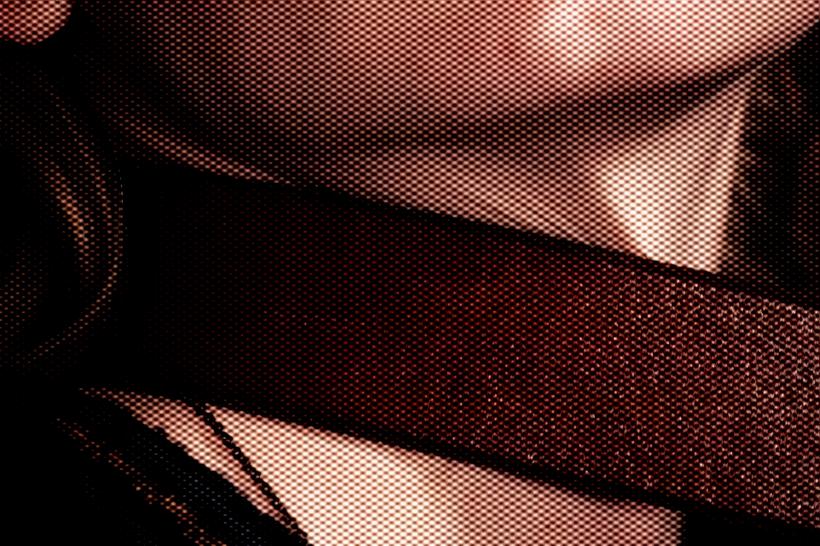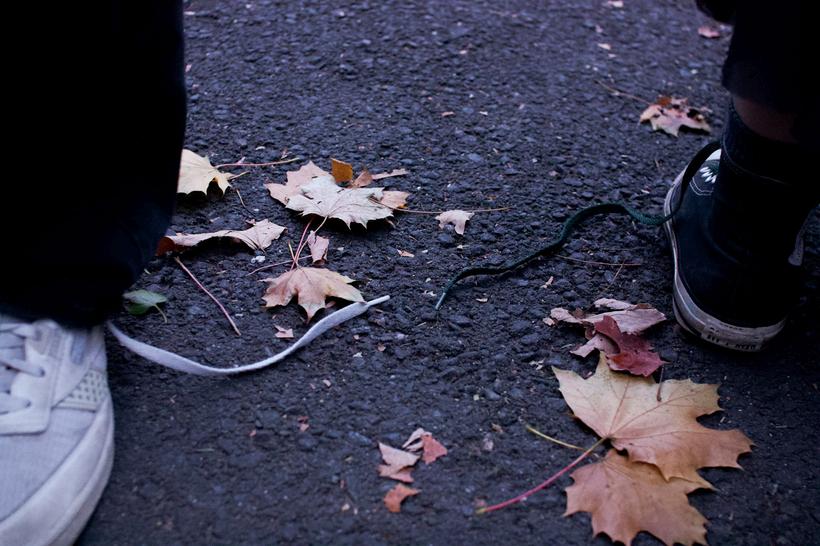Wearing Sex:
The Subtle Artistry of Intimate Mark-Making (or not so subtle)
Written By:
River Isleib
I’ve always been a biter I never thought much about it. Just the same way people don’t think much about why they enjoy anything That in itself seems to be a perfectly valid reason to like anything. Thanks to the dopamine-draining collegiate world we live and work in, enjoyment can be few and far between Makes sense as to why so many people are clawing and gnawing for it
Hickeys are a staple on Wesleyan's semi-sexpositive campus You see them occasionally You generally know what they mean and get a sense of their origins. Maybe you wonder about the social implications of sexual activity. Who was it? Are they dating? Did they enjoy it? Was it worth it? It’s a small campus. A mark can tell many stories. And we’re a naturally curious bunch.
I thought it would be interesting to poke at the bruise, so to speak
Wearing Sex: What is it?
I mean to focus on a specific subsection of human sexual behavior, mark-making In this context I’m calling it wearing sex:
The act of wearing a mark created during an intimate moment with one (or more) other person(s).
A lot goes into receiving/giving a mark, deciding where that mark will live, communicating the process of making the mark, the physical changes occurring to one's body during mark making, and, of course, the choice to wear it Physical marks can include hickeys, bites, bruising from other impact play, written or drawn marks, or articles worn that are derived from or are participatory in one’s sexually intimate experiences
The choice to receive a mark is to have your physical person changed. In the act of mark making one is leaving another with a visible object of their presence. The consequences of making, having, and wearing that mark, or marks, extend the breadth of the human experience
What one wants, shares, or believes can go into a mark It is a means of communication between partners and the world I don’t know that we’ve given that truth the air time it deserves Even this piece will only scratch the surface of the breadth of this subject. No pun intended.
Methods: Consent and Anonymity
Consent is a critical part of the processes of intimacy and mark-making. I cannot overstress the importance of consent when it comes to intimacy There is an intense vulnerability shared when choosing to change or be changed by someone Just like in any intimate act trust is shared and held between people, It’s a conversation, a mutual consensus One that is often as hard as it is enticing I wanted to center myself in consent throughout the process of forming this collection of writing, art, and photos.
I conducted informal research as part of my writing process for this article. I collected experiences from students on and around campus, in and outside of my social world I used some external outlooks from more reputable sources than myself and a Google form I’m using those findings to note some experiences relevant to our collegiate world
To Wear or Not to Wear
So many factors go into deciding whether or not to wear sex. It can be emotionally uncomfortable or even physically endangering to wear a mark that denotes intimate activity The choice to be branded with a bruise or a scratch is an exceptionally personal choice It requires one's body to be physically changed by another person's actions Even if temporary, the gravity of that change can trigger a multitude of reactions relating to the ownership of one's body. The relations between marker and marked become physicalized on the body of the marked. Hickeys can last for a little longer than two weeks, or as short as a few days. The scale and obviousness of marks are as obvious or as secretive as the marker and the marked choose
Statement Pieces: Bodily Control
There's something to say about the empowering feelings associated with wearing sex There is not an insignificant number of individuals who reflect this idea. A common feeling written about was the “pride” individuals had towards their marks. Wearing a visible mark communicates desirability. Someone had the desire to leave the mark. The mark alludes to the process of its making The wearer desired to share that with a community outside of the maker and the marked We often don’t recognize just how hard it is to find mutual desirability It requires so much confidence and the potential for rejection Just to talk to someone you're interested in can be extremely difficult. Navigating personal boundaries, interests, and fears is difficult enough on its own. Trying to balance for another whole person multiplies the complexities. Of course, it gets easier with time and exposure. Still, so many are exploring their sexualities for the first time in college Internal and external pressures to be fully taking advantage of the “best years of our lives”
also play a huge role in building these anxieties around desirability. I wonder if this pride is connected to the relief that we feel for having jumped the social hoop of sexuality A relief that we fell into the expectation of normalcy in some way When there is so much uncertainty of self that defines our day-to-day life a physical reminder of desirability is an affirmation
To unapologetically claim wantedness by flaunting marks is a method of reclaiming the self. Wearing hickeys is a bold statement. One which is deeply connected, for many individuals, to reclaiming the body. A few individuals wrote about wearing sex as a means to make choices about their body when they otherwise feel unable to Any number of reasons could contribute to this feeling of disembodiment What spoke most to my experience were feelings of trans disembodiment and reclamation
The physical body is often a place of mixed emotions, especially for queer and trans people. When policy, institutions, and our peers tell or show us how undervalued our bodies are, joy and autonomy are actions of reclamation. In my own experience, I have felt a lack of control over the perception of my body I have had moments in which It has felt as though it never really belonged to me Wearing sex has surfaced itself as a means to recenter myself in my own form It is a space where I have full control The marks made and worn are of my own autonomous choice.
Professionalism Hates Fun: “Conceal Them! Grow Up Baby”
Even in the safety of a left-leaning university, there is so much stigma around sex. Most folks echoed the idea that sexual perception isnt sustainable in every environment It leaves a ton of room for misconceptions and judgment
Individuals wrote about how wearing sex marks opened them up to unwanted comments about their sex life No one wants their parents to perceive or comment on their sexual personhood. If you do, you may want to take that up with Freud. One individual even wrote in detail about how their parent’s comment on sex marks made them associate negative feelings with having them or receiving them
Hickeys are often written off as unprofessional, juvenile and, whoreish To wear your status as
sexually active is repulsive to the workplace, and alongside it, your authority, integrity, and cleanliness. It’s a direct reflection of purity culture But, acknowledging those facts doesn’t make them go away The choice of whether to wear or not to wear carries baggage rooted in structural control
There’s no shortage of data on how stigmas around sex only make society's sexual problems worse. Yet, American culture still trends towards devaluing sex and intimacy. If sexuality isnt directly beneficial to the production or distribution of capital why even value it at all? Sex lives are better not seen or heard. Purity culture and professionalism set social standards of sexual repression It is the fact of the culture we live in, even though Wesleyan leans sex-positive
Regardless of how normal sex is to the human experience, it’s not something easy to share openly without some vulnerability Amid the barrage of social pressures around sex, it's no surprise, that not everyone is extremely comfortable wearing sex proudly.
But there is nothing inherently wrong about the sexual practice of mark making, nor wearing them. The concept that wearing sex is unprofessional is rooted in socialization under a thick film of cisgender heteronormative misogyny Structures that deem right and wrong based on power precedences and social control mechanisms Nothing about a bruise on my neck or a bite mark on my shoulder is at all related to my ability to do my job. Except maybe, I’ll be a bit more motivated and a bit less stressed that next day.
Concluding (Re)Marks
Every day we are pulled further and further away from ourselves as we navigate classes, jobs, relationships, etc If you're lucky enough to have it, intimacy thrusts you back into your flesh You become awakened by the pain of a bite, a nip, a scratch, or the pleasure of a kiss. Through the mutual act of escaping oneself into another, sensations reset us and center us in ourselves.
It's beautiful to see the biological process ravage our bodies as endorphins push us closer and drive us to lick, nip, chew, suck, and scratch the skin of a partner To see the capillaries burst under one's skin and the red-purple shades develop We’re magical, aren't we? So quickly responding to the most minor mechanical damage The body is a world of its own, a canvas of living, breathing cells, bacteria, critters, and creatures that keep us alive. All of the curves and planes and dips and bends that make up our forms, and the ecosystem living within it.
A bruise, a scratch, a mark holds so many worlds The connection between the mark and the body, the marker and the marked, the marked and observers of the mark all meld together to create the imperfect rhetoric of sex
There's no one correct way to exist in the world Sex, fashion, and life are all a subjective collection of interactions, good and bad, with everyone around us and the institutions that uphold norms. If anything, breaking the normative culture of sexual repression that capitalistically holds up to convention and professionalism does some good. Our autonomy is our own, and the choice to use it or not reinforces that with every moment





























































































































































































